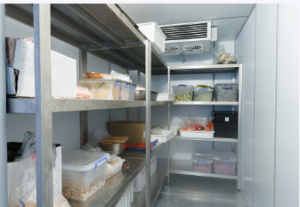Choosing the right industrial refrigeration is crucial for ensuring your business can remain operational for years to come. Choosing the right system for your business can depend on several factors, including the size and type of your facility, your budget, and the climate in which your business operates.
 Pharmaceutical industry
Pharmaceutical industry
Providing reliable temperature control is vital for maintaining the quality and efficacy of pharmaceutical products. Many pharmaceutical companies use refrigeration systems to keep their raw materials at a specified temperature. They also use chillers to keep pathogens at bay. In addition, some pharmaceutical companies use refrigeration systems for cold sterilisation. These systems also help to extend the shelf life of many medications.
Industrial refrigeration systems are also important to the chemical industry. Large refrigeration plants are required to control humidity in certain chemicals. In addition, the industrial refrigeration market is set to grow as the chemical industry expands.
One of the most important factors in improving operational efficiency is reducing wastage. It is particularly important in the pharmaceutical industry, where many products contain biological materials. Hence, efficient solutions are required to provide optimal climate control. Moreover, they need to be energy efficient to cut operational costs.
The industrial refrigeration market is expected to grow at a healthy CAGR. The most exciting part of this market is the growth in the APAC region. The region is home to many industrialised nations and a growing population. Hence, the market is projected to generate the largest revenue in the coming years.
Pharmaceutical companies are constantly introducing new drugs, and the best way to ensure they work is to use the proper temperature controls. The most efficient way to do this is to use high-performance refrigerants and state-of-the-art technology. For instance, the pharmaceutical industry has a dedicated team of specialists to identify the perfect solutions.
This team also helps in monitoring and improving the performance of refrigeration systems.
The best way to implement a solution that will last is to use a company that provides a high level of service. It includes a rapid response time in case of breakdown or service issues.
Food and beverage industry
Keeping food and beverages at the proper temperature is a vital factor in the food and beverage industry. It prevents spoilage and microbiological contamination. It also increases the shelf life of food products. Proper refrigeration can also help maintain the products’ taste and quality.
The industrial refrigeration Melbourne market is projected to witness considerable growth during the forecast period. The rising demand for processed food products drives this growth. In addition, the increasing number of refrigerated warehouses also boosts it.
Increasing industrialisation and urbanisation are also expected to drive the growth of the industrial refrigeration market. Moreover, government initiatives are also projected to drive the demand for industrial refrigeration in food & beverage applications.
Increased consumer income is also expected to drive the demand for processed food. The demand for frozen food is also on the rise. Due to the increasing disposable income, these products are highly demanded in the food and beverage industry.
The food and beverage industry is expected to witness the fastest growth during the forecast period. Various food and beverage companies require refrigeration systems to maintain product quality. It also helps in the overall production process. Moreover, the food and beverage industry companies are involved in global competition. Therefore, they are also responsible for developing sustainable solutions.
The food and beverage industry is one of Spain’s largest contributors to GDP. The industry has a turnover of 130,795.8 million euros. The industry also employs 22.1% of the workforce. Besides, the industry companies also contribute a large amount of added value. As a result, the contribution of the food and beverage industry is expected to surpass $16,653.6 million by 2028.
Strict demands for technology and equipment also characterise the food and beverage industry. Moreover, the food and beverage industry is one of the largest contributors to the global supply chain. Therefore, the demand for industrial refrigeration in food and beverage applications will also witness substantial growth in the coming years.
The industrial refrigeration Melbourne market is expected to grow at a considerable CAGR during the forecast period. The major factors expected to drive the growth of the industrial refrigeration market include the rising demand for processed food, the increasing number of refrigerated warehouses, and the growing need for convenience food products.
Healthcare sector
Various drugs and other medical materials require refrigeration technology to maintain proper temperatures. As a result, the medical sector has increased its investment in research and development, which has positively impacted the development of medical refrigerators.
In addition to medical refrigeration, refrigerators are also used in the food and beverage industry. Furthermore, the increasing use of refrigerators in transportation is also projected to drive the growth of the global industrial refrigeration market. In addition, the pharmaceutical manufacturing segment is expected to contribute significantly to the market revenue over the forecast period.
The healthcare industry has a complex service provision. Modern equipment is used in specialised clinics and hospitals to improve millions of people’s living conditions. However, there are a few large-scale vendors that control the majority of the market.
Medical refrigerators are also used for the safe storage of vaccines. It has been achieved through smart refrigeration technology. Using these devices ensures the safety of vaccines and the shelf life of other products. In addition, UHF RFID (Radio Frequency Identification) technology allows continuous monitoring of the items stored in refrigerators.
Several manufacturers are now gradually incorporating smart tracking technology into their refrigerators. For instance, the ultimate vaccine refrigerator from GT Scien is expected to provide accurate control over the distribution of vaccines.